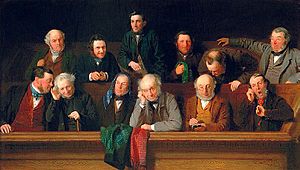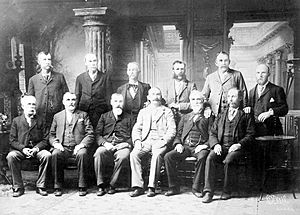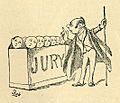Jury trial facts for kids
A jury trial is a legal process where a group of ordinary people, called a jury, listens to all the facts and evidence in a case. They then make a decision, known as a verdict. The judge usually follows what the jury decides when making their final ruling. This is different from a bench trial, where only a judge (or a group of judges) makes all the decisions.

Contents
How Jury Trials Started
The idea of a jury trial has a long history. When William the Conqueror came to England, he brought a system where people who knew about a situation would tell the court what they knew. They had to promise to tell the truth first, which is called taking an oath. The word "juror" comes from the French word jurer, meaning "to swear."
In the 1100s, kings used juries to find out facts. They would ask questions, and the jury would provide answers. The king or his helpers would then make the final decision. Over time, this system changed. Juries started making the final decision, or verdict, based on the information they heard.
Juries in Early America
Later, when the American colonies were still part of Britain, juries became important for showing how unhappy Americans were with British rule. Britain had laws called Navigation Acts that stopped the colonies from trading with countries like the Netherlands and France. Because of these rules, many colonists started smuggling goods illegally.
When smugglers were caught, they faced trials with juries made up of other colonists. These juries often felt sorry for their fellow colonists and would let them go free. This made the king very angry. To stop this, he created new courts that did not use juries. This was a big problem because it went against the usual English law and took away the colonists' rights as British citizens.
After the American Revolutionary War, the Seventh Amendment was added to the United States Constitution. This amendment protects the right to a jury trial. It was created to limit the power of the government's executive (like the President) and judicial (like the courts) branches.
Jury Trials in Civil Cases
The right to have a jury trial in civil cases is mostly found in the United States. In other countries like England, Canada, Australia, and New Zealand, civil cases are almost always decided by a judge alone, without a jury.
In the United States, only a very small number of civil cases (less than 1%) actually go to a jury trial. The Seventh Amendment also stops judges from changing a jury's decision in federal cases if the jury's findings are supported by the evidence.
In addition, the Sixth Amendment guarantees that people accused of crimes have the right to a quick trial by a fair jury.
Images for kids
-
W. S. Gilbert's Bab Ballads (1920)
See also
 In Spanish: Jurado para niños
In Spanish: Jurado para niños
 | Leon Lynch |
 | Milton P. Webster |
 | Ferdinand Smith |



